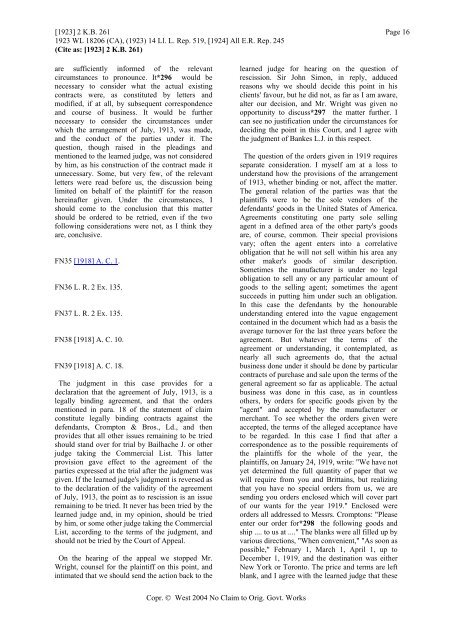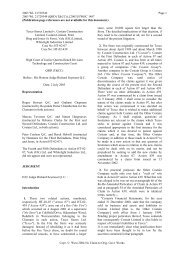Rose - Thomson Reuters
Rose - Thomson Reuters
Rose - Thomson Reuters
Create successful ePaper yourself
Turn your PDF publications into a flip-book with our unique Google optimized e-Paper software.
[1923] 2 K.B. 261 Page 161923 WL 18206 (CA), (1923) 14 Ll. L. Rep. 519, [1924] All E.R. Rep. 245(Cite as: [1923] 2 K.B. 261)are sufficiently informed of the relevantcircumstances to pronounce. It*296 would benecessary to consider what the actual existingcontracts were, as constituted by letters andmodified, if at all, by subsequent correspondenceand course of business. It would be furthernecessary to consider the circumstances underwhich the arrangement of July, 1913, was made,and the conduct of the parties under it. Thequestion, though raised in the pleadings andmentioned to the learned judge, was not consideredby him, as his construction of the contract made itunnecessary. Some, but very few, of the relevantletters were read before us, the discussion beinglimited on behalf of the plaintiff for the reasonhereinafter given. Under the circumstances, Ishould come to the conclusion that this mattershould be ordered to be retried, even if the twofollowing considerations were not, as I think theyare, conclusive.FN35 [1918] A. C. 1.FN36 L. R. 2 Ex. 135.FN37 L. R. 2 Ex. 135.FN38 [1918] A. C. 10.FN39 [1918] A. C. 18.The judgment in this case provides for adeclaration that the agreement of July, 1913, is alegally binding agreement, and that the ordersmentioned in para. 18 of the statement of claimconstitute legally binding contracts against thedefendants, Crompton & Bros., Ld., and thenprovides that all other issues remaining to be triedshould stand over for trial by Bailhache J. or otherjudge taking the Commercial List. This latterprovision gave effect to the agreement of theparties expressed at the trial after the judgment wasgiven. If the learned judge's judgment is reversed asto the declaration of the validity of the agreementof July, 1913, the point as to rescission is an issueremaining to be tried. It never has been tried by thelearned judge and, in my opinion, should be triedby him, or some other judge taking the CommercialList, according to the terms of the judgment, andshould not be tried by the Court of Appeal.On the hearing of the appeal we stopped Mr.Wright, counsel for the plaintiff on this point, andintimated that we should send the action back to thelearned judge for hearing on the question ofrescission. Sir John Simon, in reply, adducedreasons why we should decide this point in hisclients' favour, but he did not, as far as I am aware,alter our decision, and Mr. Wright was given noopportunity to discuss*297 the matter further. Ican see no justification under the circumstances fordeciding the point in this Court, and I agree withthe judgment of Bankes L.J. in this respect.The question of the orders given in 1919 requiresseparate consideration. I myself am at a loss tounderstand how the provisions of the arrangementof 1913, whether binding or not, affect the matter.The general relation of the parties was that theplaintiffs were to be the sole vendors of thedefendants' goods in the United States of America.Agreements constituting one party sole sellingagent in a defined area of the other party's goodsare, of course, common. Their special provisionsvary; often the agent enters into a correlativeobligation that he will not sell within his area anyother maker's goods of similar description.Sometimes the manufacturer is under no legalobligation to sell any or any particular amount ofgoods to the selling agent; sometimes the agentsucceeds in putting him under such an obligation.In this case the defendants by the honourableunderstanding entered into the vague engagementcontained in the document which had as a basis theaverage turnover for the last three years before theagreement. But whatever the terms of theagreement or understanding, it contemplated, asnearly all such agreements do, that the actualbusiness done under it should be done by particularcontracts of purchase and sale upon the terms of thegeneral agreement so far as applicable. The actualbusiness was done in this case, as in countlessothers, by orders for specific goods given by the"agent" and accepted by the manufacturer ormerchant. To see whether the orders given wereaccepted, the terms of the alleged acceptance haveto be regarded. In this case I find that after acorrespondence as to the possible requirements ofthe plaintiffs for the whole of the year, theplaintiffs, on January 24, 1919, write: "We have notyet determined the full quantity of paper that wewill require from you and Brittains, but realizingthat you have no special orders from us, we aresending you orders enclosed which will cover partof our wants for the year 1919." Enclosed wereorders all addressed to Messrs. Cromptons: "Pleaseenter our order for*298 the following goods andship .... to us at ...." The blanks were all filled up byvarious directions, "When convenient," "As soon aspossible," February 1, March 1, April 1, up toDecember 1, 1919, and the destination was eitherNew York or Toronto. The price and terms are leftblank, and I agree with the learned judge that theseCopr. © West 2004 No Claim to Orig. Govt. Works
















